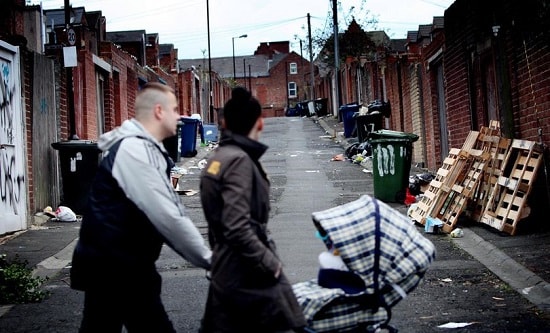
‘Residents living in the most deprived areas of England and Wales are dying at double the rate of those in the most affluent postcodes.’ Office for National Statistics.
By the end of May, the North East had the highest rate of coronavirus infection of any region in England. The four highest rates are in Sunderland (487 out of every 100,000 testing positive) followed by Gateshead, South Tyneside and Middlesbrough fourth. Newcastle is 32nd out of 150, with 342.8 testing positive per 100,000 to date.
Poverty, which leads to health inequalities, has laid the groundwork for higher infection rates and chances of death. People living in poverty have to deal with overcrowding in housing, which makes it impossible to self-isolate; they are also less likely to have jobs where they can work from home and are more likely to have to use public transport to travel meaning an increased chance of becoming infected. They are also more likely to rely on council services which have been cut.
Poverty in the North East
The North East has seen the country’s biggest rise in child poverty since 2014. Research carried out by the End Child Poverty coalition estimates that almost a quarter (23.7%) of children in the North East are living in poverty before housing costs have been taken into account, up from 17.3% four years ago – the biggest percentage point rise in the country. These figures were calculated before the Covid-19 crisis, so inevitably this is going to compound the situation. Two-thirds of families in the North East are one pay cheque away from poverty as a result of the crisis. It’s estimated that more than 53,000 children in the North East are in the most income-deprived 10% of the country.
Life-saving infrastructure decimated by Labour councils
In 2019, a cross party group of MPs warned that a decade of funding cuts have left councils at breaking point, with the social care system on the point of collapse. Councils across England have cut more than £8bn from adult social care budgets since 2010.
Poor residents suffer most from council cuts. These cuts have ripped out infrastructure needed to deal with the coronavirus crisis and has added to the strain on hospitals. Despite this, in March 2020 – on the eve of the pandemic – Labour-led councils in the North East passed more crushing cuts budgets, with no resistance from the trade unions.
Between 2010 and 2018 Sunderland Labour council cut £290m of services, and axed more than 5,000 council jobs, reducing staffing by more than half. A further £3m of cuts were voted through this year. Alongside the annual 3.99% rise in council tax, poor families are being further squeezed.
Gateshead Labour council has cut £170m over the last 10 years with a further £50m to be cut over the next five. On 10 April, Eighton Lodge care home in Gateshead was threatened with the police if they did not allow in a resident who had been returned from hospital during a spike in deaths without being tested for the virus.
Despite the huge risk to staff and residents in care homes from the virus, Labour-led Newcastle council voted to cut £20m worth of services, £9.5m of it from social care services. This includes cutting support to help disabled people pay their care costs; reductions in crisis support and one-to-one support in care homes; and a £200,000 cut to voluntary organisations. By 2022, Newcastle council will have cut £67.7m from social care spending since 2011. Meanwhile demand for these services is increasing, in particular because of benefit cuts.
Care home sector on the brink of collapse
Over the last five years, more than 400 care home providers across the country have collapsed because of funding cuts. On 18 May, more than 20 care homes in the North East sent a legal warning to North Tyneside Council stating that the care sector would collapse within five days if funding was not provided.
The legal warning says: ‘This letter stands as our client’s formal notice to the council that the care home market within North Tyneside is facing imminent collapse due to the council’s conduct in the lead up to and during the current coronavirus pandemic. The council has through its own sustained actions over a number of years, weakened and undermined the sustainability of the care home market; such that the market is incapable of withstanding the costs and effects of Covid-19….As vacancies increase due to deaths, the running of homes within North Tyneside is becoming increasingly unsustainable.’
Mark Moncada




